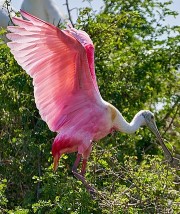|
Home
|
Sep 5, 2022
This week’s themeFlowers This week’s words roseate daisy-chain orchidacity tall poppy wallflower 
Roseate Spoonbill
Photo: Jgocfoto / Wikimedia Previous week’s theme Metaphors & idioms A.Word.A.Day
with Anu GargAt one time any self-respecting Jane Austenite would be expected to know the language of flowers by heart. Whole dictionaries were published about what flower symbolized what. They call it floriography: coded communication through the use of flowers. If you knew your floriography, you could probably skip over half of any Victorian romance novel. In those days a “well-bred”* person was expected to know that a red rose meant love and a yellow rose friendship. A lily was a symbol of purity and innocence while mimosa, aka touch-me-not,** was of chastity. Well, F all that prudish obsession with chastity! To me, each flower comes with the message that there’s hope for humanity. This week we’ll see five flower-related terms that are used figuratively. Do you feel partial to some particular flower? Have a story related to flowers? Share below or email us at words@wordsmith.org. *Not sure what today’s well-bred person is supposed to know. The language of emojis? **Mimosa pudica, to be more precise roseate
PRONUNCIATION:
MEANING:
adjective: 1. Like a rose, especially in color: pink, red, etc. 2. Bright; favorable; promising. 3. Unreasonably optimistic. ETYMOLOGY:
From Latin roseus (rosy), from rosa (rose), from Greek rhodon (rose).
Earliest documented use: 1449. Also see rose-colored.
USAGE:
“This roseate future isn’t pending, which causes one to despair.” Randy Boyagoda, Magic and Greed: Ngugi wa Thiong’o’s New Novel; Harper’s Magazine (New York); Sep 2006. See more usage examples of roseate in Vocabulary.com’s dictionary. A THOUGHT FOR TODAY:
The more original a discovery, the more obvious it seems afterward. -Arthur
Koestler, novelist and journalist (5 Sep 1905-1983)
|
|
Subscriber Services
Awards | Stats | Links | Privacy Policy
Contribute | Advertise
Awards | Stats | Links | Privacy Policy
Contribute | Advertise
© 1994-2025 Wordsmith